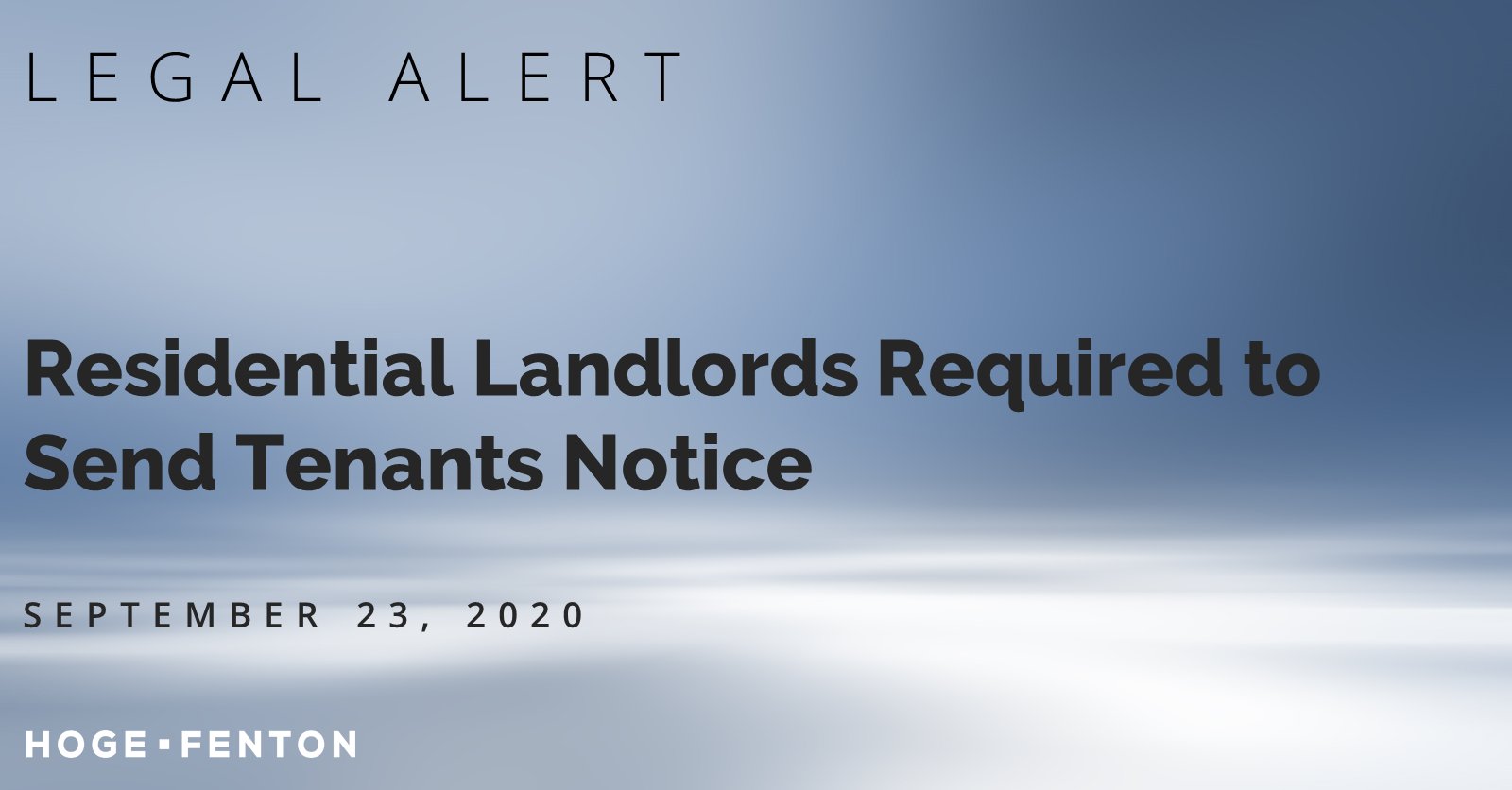Residential Landlords Required to Send Tenants Notice
By Hoge Fenton | 09.23.2020 | Firm Post

RESIDENTIAL LANDLORDS REQUIRED TO SEND TENANTS NOTICE BY SEPTEMBER 30, 2020
OR MAY WAIVE THE RIGHT TO EVICT OR SEEK UNPAID RENT LATER
by Giuliana Ferrante, Attorney, Real Estate & Land Use Group
On August 31, 2020, Gov. Gavin Newsom signed AB3088, providing a framework for California’s residential landlords to preserve their rights to later claim unpaid rent and/or evict tenants for unpaid rent, while protecting tenants who have demonstrated financial hardship arising out of the COVID-19 pandemic. Under AB3088, landlords intending to seek damages from residential tenants who have missed rent between March 1, 2020 and August 31, 2020 MUST SEND THE “COVERED PERIOD” NOTICE ON OR BEFORE SEPTEMBER 30, 2020, OR THE RIGHT TO EVICT OR SEEK UNPAID RENT AT A LATER TIME MAY BE WAIVED. [See the notice form provided by the State of California here.]
In order to later seek damages for unpaid rent under AB3088, residential landlords must provide several documents to tenants who have not timely paid rent:
- A 15-day Notice to Pay Rent or Quit (as opposed to the usual 3-Day Notice);
- The applicable “Notices from the State of California” about the tenant’s’ rights under AB3088;
- A declaration form for a tenant to sign, under penalty of perjury, explaining that they have a COVID-19 related hardship, such as the loss of a job, a need to provide childcare to school-aged children whose schools remain closed, or higher medical bills.
AB3088 lists the exact language that landlords must provide to tenants in the “Notices from the State of California.” The language differs based on the time period during which the tenant missed rent:
- The “Covered Period:” March 1, 2020 – January 31, 2021 (all tenants who have missed rent from March 1, 2020 to August 31, 2020 MUST be provided this notice by September 30, 2020 to preserve the landlord’s right to collect payment)
- “The Protected Period:” March 1, 2020 – August 31, 2020; (in addition to the “Covered Period” notice above)
- “The Transitional Period:” September 1, 2020 – January 31, 2021;
- If the landlord already has information on file proving that a tenant’s income is over 130% of the median income for the tenant’s county (as published Department of Housing and Community), a separate notice must accompany the notices above.
If residential landlords follow AB3088’s notice requirements, those landlords may then seek rental debt accrued during the “covered period” in small claims court on or after February 1, 2021. Tenants who fail to pay at least 25% of the rent due between September 1, 2020 and January 31, 2021 on or before January 31, 20201 may also be subject to eviction – unless that landlord’s county or municipality has an ordinance in place that expands AB3088’s tenant eviction protections.
California has made notices available for residential landlords’ use at the California Department of Real Estate Website in several different languages that can be viewed here. Local real estate groups also have forms available. Please take caution to send tenants all notices applicable; often, tenants may be entitled to more than one of the above notices based on when the tenant has missed rent. Some legislative advocates are recommending that the landlord send the applicable notice and declaration form each time a tenant misses a rental period to preserve the landlord’s rights. Hoge Fenton’s Real Estate and Land Use Group is standing by ready to help.
Have a dispute with a residential or commercial landlord/tenant?
Contact our Real Estate and Land Use Group at
 |
Giuliana Ferrante is an accomplished litigator in the firm’s Real Estate and Land Use Group. Giuliana represents clients through all stages of litigation from case evaluations to appeals. Her practice focuses on handling intricate appellate matters, business litigation, insurance coverage, insurance bad faith claims, and other commercial disputes. |
 |
Steven Kahn is a Shareholder and Chair of the Real Estate and Land Use Group who balances litigation skill with strategy to achieve his clients’ goals and protect their interests. He focuses on real estate disputes and litigation. Steven represents clients throughout Northern California, including individuals, families, trusts, real estate professionals, insurers, municipalities, and businesses of any size, private or public. |
 |
Sean Cottle is a Shareholder and real estate attorney who has practiced law for over 30 years and is well respected by his clients and many others in the business community. Sean’s practice focuses on transactions involving the purchase, sale, and leasing of commercial, industrial, retail property, and residential developments, both in California and elsewhere throughout the country. |
This information is provided as an educational service by Hoge Fenton for clients and friends of the firm. This communique is an overview only, and should not be construed as legal advice or advice to take any specific action. Please be sure to consult a knowledgeable professional with assistance with your particular legal issue. © 2020 Hoge Fenton












